Serbian-Bulgarian War 1885 (part 3)
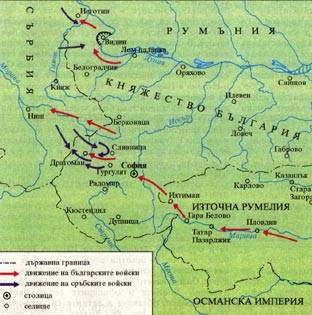
The connection of Eastern Rumelia with the principality of Bulgaria on 6 on September 1885 of the year radically changed the balance of power in the Balkan Peninsula and caused a reaction not only of the Ottoman Empire, but also of neighboring countries. Greece announces immediate mobilization, stating that it will enter Turkish territory and attach parts of Macedonia as compensation. Romania is seeking expansion in Southern Dobrudja. Serbia is categorically against the union, which claims hegemony over the Slavic population of all the Balkans. On September 9, Serbia announces the mobilization of spare ranks in order to “preserve balance” on the Balkan Peninsula, established by the Berlin Congress (1878).
Connection is a violation of the Berlin Treaty. Acknowledging a connection is an international act. Bulgarian diplomacy is facing serious problems.
On September XNUM, Prince Alexander I Batenberg notifies the representatives of the Great Forces in Sofia that he took control of South Bulgaria. This is the first note on the Connection, drawn up by the government, but signed by the prince. It recognizes the overlord power of the Sultan and asserts that the Union is not a hostile intention towards the empire. At the same time, the note expresses the firm confidence and readiness of the people to protect the cause of the union from other people's encroachments.
The first diplomatic recall comes from London. Lord Salisbury, thinking that the events in Plovdiv are the machinations of Russian diplomacy, 7 proposes that Vienna and Berlin make a strict remark to the Bulgarian government about the need for strict compliance with the articles of the Berlin Treaty. Bismarck, who seeks to preserve the “European concert” against all odds, replies that these actions will have some meaning if they are performed collectively by the forces that have signed this agreement. In a conversation with the British envoy in Berlin, he adds that he has already entered into contact with St. Petersburg, Vienna and Istanbul, since the interests of the governments of these capitals are most affected by the Rumelian events.
The first news of the Plovdiv revolution makes a big impression in the capital of the empire. At first, Porta thinks that this is some kind of military-political demonstration against the identity of the governor-general. Later, at night 6, the grand vizier is aware of the natural course of events and makes a request to the embassy about the opinion of the Great Forces on the present revolutionary situation in Rumelia. The envoys respond unanimously that they do not approve of this situation, but can not add anything. The Sultan is in great hesitation: on the one hand, he sees that, if his troops enter Rumelia, the Bulgarians can expand the revolutionary movement, including Macedonia, from where it will go to other European parts of the empire where the Bulgarian population lives; on the other hand, his inaction could drop in the eyes of the Islamic world the prestige of the caliph, who according to Sharia should not yield a single inch of the Islamic land without a fight.
However, there should be a quick and energetic reaction from Russia and all the Great Forces about the non-intervention of the Ottoman Empire in Rumelia. Nelidov declares to the great vizier that the appearance of at least one Turkish soldier in Rumelia will have disastrous consequences for Porta. Under this threat, the Port sends out one district note in which it rejects the idea of military intervention. Referring to the rights given to her by the Berlin Treaty (to establish the status quo with military force), Turkey declares that this time it refrains, referring to the dangerous situation in which the region is located. The note is written in a very moderate form and does not contain any censure to the prince. This special attention of the suzerain to the vassal, who robbed the whole area, was probably the result of a cunning and complete reverence for the telegram that Prince Alexander sent to the sultan from Plovdiv. This shows the peace-loving mood of Abdul Hamid. The change in grand vision gives this peacefulness an even more tangible expression.
It is clear to the great forces that Turkey will not be willing to regain its rights through weaponsbut they are worried that the revolutionary wave will spill over into Macedonia, and it is clear to all the cabinets that Austria-Hungary will not remain cold-blooded with the Bulgarian influence on the province, which it considers exclusively the sphere of its influence. (Austria sharpens teeth on the “access to the warm seas”, namely the port of Solun, or Thessaloniki in Greek.)
Upon receiving the news of the uprising in Rumelia, Count Kalnoki telegraphs Baron Kaliche in Istanbul to force Porto to take measures to preserve the Macedonian border (from Rumelia). The German envoy, as well as Nelidov, demand from Turkey to avoid embarrassment in its European domains. With the help of the consuls of the Great Forces in Plovdiv, Kalnoki makes a warning to Prince Alexander that Europe will not allow the Bulgarian capture of Macedonia.
The prince does not need such a warning. Before that, he himself had told one agent that, if there was any riot in Macedonia, Austria would restore order there, and its intervention would be fatal for the independence of the Balkan peoples.
The opinion of the extreme Bulgarian patriots is different. The Macedonian Voice newspaper published an appeal to all Bulgarians in Macedonia to “stand up as one,” and 11-th Karavelov is forced to send a telegram to Zakhari Stoyanov in Plovdiv: “Macedonian volunteers go to Plovdiv to take guns and go to Macedonia. Apply the most stringent measures so that no volunteer goes to Macedonia. ”
The Bulgarian government believes that the best way out of the crisis is an agreement with Porto. 21 September Prince Alexander sends Dr. Chomakov and Iv. Petrova to Istanbul with the task of convincing Porto in the face of the Grand Vizier to recognize the Union.
In the capital of the empire, these delegates are met as representatives of the rioters:
On the first evening, they are kept arrested in a konak (palace) of a police prefect, then placed under police supervision.
The great contacts of Dr. Chomakov with the diplomatic representatives at the court of the Sultan relieve Prince Alexander of embarrassment to see his representatives tormented. In the end, they are accepted by the Grand Vizier, who apologizes for what happened. The British still assure the Bulgarian government not to despair, and White exercises pressure on Camille Pasha.
The Bulgarian government was ready for some compromises. Even 27, September, the official representative of Bulgaria in Vienna, Nachovich, informs Count Kalnoki that, under the pressure of the English diplomatic agent, Prince Alexander will accept a personal connection with the condition that some changes will be made in the Organic Charter of the region.
The personal connection (on which English diplomacy insisted) meant that the prince would be the Wally of a privileged formal Turkish vilayet under the already hated head of Eastern Rumelia.
After a stormy revolutionary euphoria, this, of course, was a great disappointment, but the prince saw no other means of saving the situation.
This big compromise does not resolve the crisis. Maybe this reassured Porto, but the Serbian claims remained, from which the greatest dangers went.
Bulgaria was faced with a dilemma: to abandon the Union altogether or to cede some of its western regions to the Serbs.
The Plovdiv revolution, of course, affected the interests and ambition of the Great Forces, but mostly it was a blow to the rest of the young Balkan states. Bulgaria almost doubled its territory and became the largest state on the Balkan Peninsula against the agonizing Ottoman Empire, according to the then concepts, as the claimant of the largest inheritance. Before such a prospect, the Rumelian question faded into the background - the balance was disturbed (again, according to the terminology at that time) in the Balkans.
Of all the neighbors of Bulgaria, Romania was the calmest of all. Romanians claim that they are not worried about the Rumelian events, because they do not consider themselves to be a Balkan nation and even cancel their big autumn maneuvers, although because of disputes in the summer of 1885 about Arababia, Kantacuzin was ready to start a war. The main motive of the Romanian policy is the independence of Bulgaria from St. Petersburg, since Romania at this moment is focused on Austria-Hungary and Germany.
Greece accepts the Plovdiv events with great indignation. The Greeks consider Rumelia a zone of influence even before the Berlin Congress (Megali idea). They accept the Union as the infringement of Hellenism. Since Bulgaria is too far away to attack it, the Greeks want an attack from their government in Macedonia. That is, Greece also hoped for territorial expansion at the expense of the Ottoman Empire, which Europe sees with caution.
In Serbia, the king of Milan is connected to Vienna by a secret treaty from 1881.
The old Serbian patron and ally (Russia) after the 1875-1878 wars showed the Treaty of San Stefan that he considers Serbian interests secondary. The Slavic empire, according to Milan, fought for the creation of "Great Bulgaria" to the detriment of Serbian interests.
Even at the Berlin Congress, Serbian representative Joan Ristic, in order to preserve the newly joined territories (Pirot and points inhabited by ethnic Bulgarians near him) was forced to sign a trade agreement with Austria-Hungary, in which he pledged to build a railway to the Turkish border. In the long run, this would accelerate the development of the Serbian economy, but at this point there was only a way to make Serbia dependent on the Austrian economy. Milan was sincerely convinced that if Russia supported Bulgaria, Serbia should cooperate with Austria-Hungary. The Montenegrin Prince Nikolai Petrovich-Niegosh as an opponent led by the Serbs in Milan had a great deal of distrust. Greece in previous wars with Turkey proved to be an unfaithful friend. In Bulgaria, he sees the undeservedly awarded participant and future rival. “I consider Great Bulgaria, which is approaching close to the San Stefano borders, a coffin for Serbism,” said the king to the Austrian envoy in Belgrade. In the 1881 year (16.08.1881), a secret convention was signed with Austria-Hungary, the paragraph 2 of which states that Serbia will not benefit from any policies or participate in actions against the interests of Austria-Hungary, including in areas under Austrian occupation (Bosnia and Herzegovina and Novopazar Sandjak). In return, Austria-Hungary recognizes the proclamation of Serbia as a kingdom and is committed to helping Serbia expand southwards. Paragraph 7 states: “If, by coincidence, ... Serbia will have the opportunity to expand southwards (excluding Novopazarsky Sanjak), Austria-Hungary will not oppose this ...” On the other hand, Serbia is not obliged to sign treaties with any governments without prior consultation with Austria-Hungary.
The following year, Serbia is declared a kingdom, and the emperor Franz Joseph becomes the first to recognize Milan as king of Serbia.
The king of Milan quickly decides to go to war "without risks" and travels to Vienna, where he declares to the emperor and count Kalnoki that he will immediately attack Bulgaria.
The emperor and Kalnoki, who still do not know about the Union, whose business and participation in this is Russia, advise Milan not to hurry. He tends to wait, but no more than 5 days, and provided he begins mobilization immediately. Franz Joseph agrees to mobilize, without asking the opinion of Kalnoki, who on this occasion even wishes to resign. Milan, still from Vienna, telegraphs her government to begin mobilization. The position of Count Kalnoki is strongly opposed to the attack on Bulgaria. He even predicts to the Serbian Minister-Chairman that if there is such a war, Serbia will be defeated. Of all the conversations in Vienna, Milan perceives only the idea of territorial compensation for Serbia and promises to wait until it sees what the result of the negotiations between the Great Forces will be.
Negotiations are proceeding slowly because of their artificial braking by the British, whose envoy either does not have instructions, then brings new arguments. In the end, a declaration was created, which in common phrases invites Bulgaria, Serbia and Turkey to adhere to international treaties.
This hazy rhetorical document does not make a proper impression in any of the capitals. The situation becomes serious. In Nis Milan claims to the Turkish representative Kyamal Bey that if one Serbian soldier, even half a soldier, will be wounded by Bulgarians, his personal honor will be affected, and he will immediately launch a victorious offensive at the head of his troops. The Turkish diplomat tried to console the king in a curious way: they say, look, the wisdom of the Sultan, who, although robbed by the whole province, does not lose his composure and composure. The advice is good, but Milan did not follow it.
24 October 1885 Year The Great Forces convene a conference of envoys in Constantinople (Istanbul), whose main task is sanctions on the Bulgarian issue. During the meetings, each country puts forward its position. There is no expected violent reaction from Turkey, but a surprise for the Bulgarians was the position of Russia, which categorically opposed itself to the Union and offered to resolve the issue without serious consequences, restoring the situation to what it was before 6. Three days after the Connection Act, Russia withdraws its officers from the army of the principality and from the Rumelian militia, also orders the war minister (Major-General Mikhail Alexandrovich Kantakuzin) in the government of P. Karavelov to resign. The position of Russia, in essence, is explicable and logical. Russia fears that, apart from everything else, this is a conspiracy of anti-Russian forces in Bulgarian society. The overthrown Directorate (Government of Rumelia) of the People’s Party and the regional governor G. Kristevich were Russophiles, in contrast to the Liberal Party, which was behind the BTCRC (Bulgarian Secret Revolutionary Committee).
The success of the Union strengthens the position of Alexander I of Batenberg, who is disapproved by Petersburg (i.e. Alexander III). Following its interests, Germany, France, and Austria-Hungary are against the Union.
Contrary to expectations, England, which was at first against it, after listening to Russia's position, changes its mind. British diplomacy sees in this situation a favorable moment for weakening Russian influence in Bulgaria and for strengthening its own positions, thus expanding its sphere of influence in the Balkans. In the meantime, Serbia and Greece are provoking powerful anti-Bulgarian propaganda.
Without waiting for the results of the conference, 2 of November 1885 of the year, the king of Milan declares war on Bulgaria. Even 9 September, Serbia announced the mobilization of spare ranks, which is completed 12 th. The Serbs are ready to recognize the Union if Bulgaria gives them the cities of Vidin, Tryn and Radomir supposedly inhabited by Serbs. Even 27-th Serbian forces are trying to cross the border near Tryn, but they are being pushed back. A month after this is followed by a second border provocation. Bulgaria is protesting in front of the Great Powers, but to no avail. Serbia begins the war under the pretext of attacking the Serbian regions of the Bulgarian troops.
On the same day, Alexander I Batenberg publishes a manifesto:
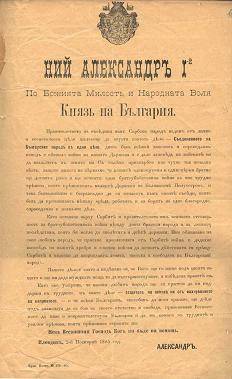
MANIFEST OF PRINCE ALEXANDER I BATENBERG ABOUT THE BEGINNING OF WAR BETWEEN SERBIA AND BULGARIA
Plovdiv, November 2 1885
We, Alexander I,
By the grace of God and the people's will, the prince of Bulgaria.
The government of the Serbian people next to us, driven by personal and egoistic forces and wanting to foster a holy cause - uniting the Bulgarian people into a single whole - today, without any legal and just reason, declared war on our state and ordered its troops to invade our land. With great regret, we heard this sad news, because we never believed that our half-brothers and brothers of the same faith would raise their hands and start a fratricidal war in these difficult times that small states on the Balkan Peninsula go through, and so inhumanly and recklessly will treat their neighbors, who, without harming anyone, work and fight for one noble, just and commendable cause.
Leaving on the conscience of the Serbs and their government all the responsibility for the fratricidal war between the two fraternal peoples and for the bad consequences that could happen for both states, we declare to our beloved people that we accept the war proclaimed by Serbia and ordered our brave and valiant troops to take action against the Serbs and as a man to defend the land, honor and freedom of the Bulgarian people.
Our work is holy, and we hope that God will take it under his protection and give us the help we need in order to triumph and defeat our enemies. Since we are confident that our beloved people will support us in a difficult but holy deed (protecting our land from the invasion of the enemy), and that every Bulgarian capable of carrying weapons will go under the banner of fighting for his fatherland and freedom, calling the Almighty to protect and patronize Bulgaria and help us in difficult and challenging times, which is our country.
It was published in Plovdiv on the second of November one thousand eight hundred and eighty-five.
Alexander.
Bulgaria sends a note to all the Great Forces asking them to intervene as peacekeepers, but no one should answer.
And only the suzerain, the Ottoman Empire, responds, declaring that it will send its troops as reinforcements if the principality refuses to join.
Action plan of both parties
Serbia
The general plan of Serbia is to advance troops in Pirot-Tsaribrod direction and by numerical superiority break the Bulgarians in the border areas near Tsaribrod, then defeat the arriving Bulgarian units from Thrace, take Vidin and the capital of Bulgaria - Sofia (the main goal: in this way Bulgaria’s link with Macedonia is broken, contributes to the plans of the Serbian hegemony in the Balkans), where the king himself Milan Obrenovic will come to the podium and dictate peace terms:
- The entire territory of Bulgaria from the Serbian border to the Iskar River will be annexed to Serbia;
- Serbian occupation of the rest of the principality;
- relocation of the capital from Sofia to Tyrnovo;
- military parade of Serbian troops led by Milan itself in Sofia;
- Huge cash compensation.
On the front against Sofia, the Serbs 42 000 man and 800 cavalrymen (Nishav army) and 21 000 people. on the Vidinsky Front (Timosh Army), also 8 800 people. and reserve. All are armed with Mauser-Milanovic rifles, have 400 obsolete guns, and expect about 30-speed-fighters from France.
Later, Serbian forces reach 120 000 people, of which 103 000 people. - regular army.
The supply is well arranged in military warehouses and collection from the population. Most of the soldiers are poorly trained, and the best commanders, Jura Horvarovic and Jovan Belimarkovic, veterans of the wars with Turkey (1876-1878), by the will of the king of Milan, do not participate in this war.

Bulgaria
Russia recalls its officers as a protest against the act of unification. Only the Bulgarians in service in the Russian army remain.
The young Bulgarian state is seriously lacking qualified officer personnel, the only hope is that the 40 young Bulgarian officers who have returned from the Russian academies who have just graduated from or stopped the course.
There are not enough sergeants either (30 Junkers have been appointed sergeants to companies).
86 000 people have been trained through the barracks. (Principality of Bulgaria + East Rumelia). Together with volunteers (volunteers) and militias, the Bulgarian army has no more than 100 000 people.
The infantry is still armed with the Provisional Russian Directorate:
- 11-mm gun "Shaspo" arr. 1866 g., 15,24-mm "Krnka" arr. 1864 g., 10,66-mm „Berdana-2”, also captured from the Russian-Turkish war, 11,43-mm “Peabody-Martini” arr. 1871 g. And multiply charged 11-mm "Henry-Winchester" arr. 1860
Revolvers - 44-mm "Smith and Wesson" Russian sample.
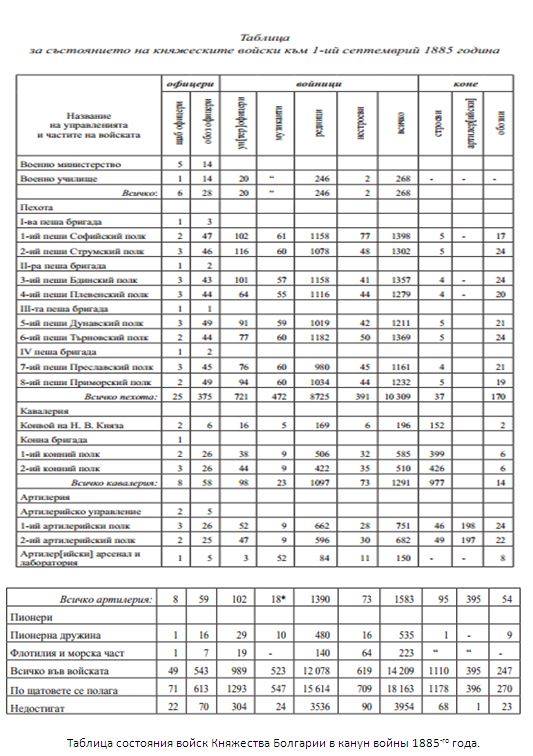



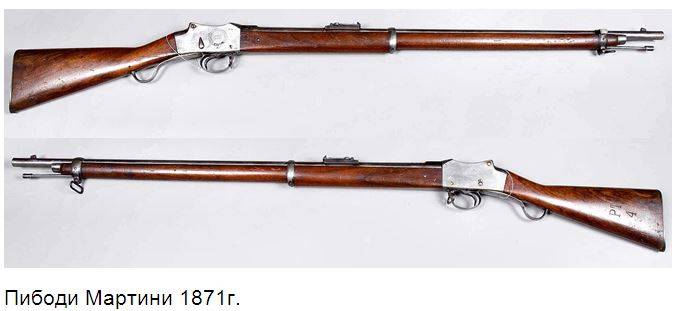

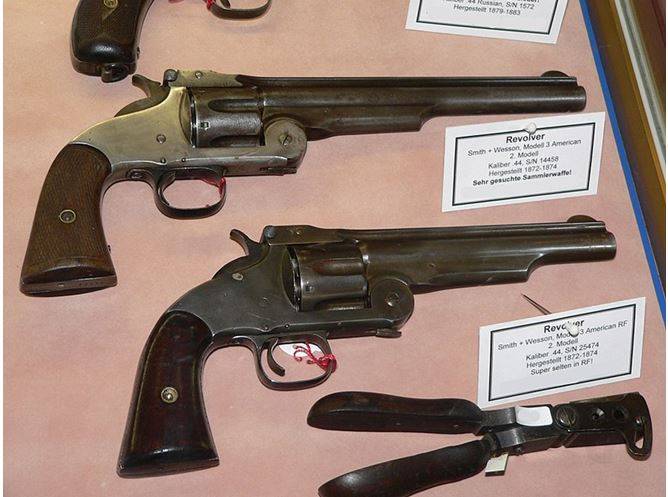
Artillery
202 cannons, of which 148 are fieldwork, Krupp 9 and 4 are pound, 20 are mountain, 24 are serf, also 6 and 10 are barrel dog systems.
A distinctive feature is a separate charge, direct fire shooting and the absence of recoil devices. The maximum firing range for 9-pounders is 3200-4500 m, and for 4-pounders - 2400-3300 m. Grenade - one-stage. There is also a grenade grenade to destroy infantry (later called "shrapnel"). Artillery was used battalion, deploying in the combat ranks of the infantry, the fire is conducted from open positions by voice-controlled fire. Organizationally not associated with the infantry.
Danube battle acts on the Danube flotilla, which includes a ship detachment (4 ships) and a mine detachment (2 destroyers). The personnel - 6 officers, 145 sailors and 21 civilian specialists. The task of the flotilla is to supply the Vidinsky fortress garrison. The main task is performed by the steamboat “Golubchik” and the boat “Motala”.
Logistic support
There is also a shortage of ammunition and uniforms - spare, militia and volunteers fight in their own clothes.
Food is provided voluntarily by the population and with the help of donations from wealthy Bulgarians from abroad.
Medical care is at a rather bad level - there are 180 doctors and 8 vets in all of Bulgaria. Military hospitals (hospitals) does not exist.
The Bulgarian troops are divided into two corps. Eastern (it contains most of the troops), which is concentrated on the Turkish border, from where the main attack is expected, and the Western Corps - the rest of the military units along the Serbian border. Bulgaria had a plan for waging war against the Ottoman Empire, but there was no plan against Serbia (Bulgaria did not expect such a war)
After the declaration of war, the plan of action was as follows.
The weak Western Corps should have defended before the arrival of the Eastern Corps and then launched a general attack. Before the start of intensified military operations, the western corps was again divided into two - the Western and the Northern. The task of the north was the defense of Vidin, and the West was responsible for protecting Sofia. The commanders were Captain Atanas Uzunov and Major Avram Gujev - by the time the Bulgarian officer with the highest rank in the Bulgarian army, so this war is called the war of the captains. The commander-in-chief of all Bulgarian troops is Prince Alexander I Batenberg.
The beginning of hostilities
The western front is divided into 7 units and has the forces of the order of 17 437 soldiers and 34 guns to stop the Serb offensive. 2-November Serb part Tsaribrodskie attack positions that defend a retinue (1 3 has regiment brigade) 4-Pleven Infantry Regiment under the command of Captain Andrew Bukureshtlieva and 3 couple (3 detachment) 1-th infantry regiment of Sofia. The balance of 7: 1 attackers and defenders forces the Bulgarians to retreat to the line of the Dragomanian positions, since they cannot afford to give great sacrifices at the very beginning of the war. Around Dragoman, the troops retreating from the Tsaribrod position unite with one squad and one regiment.
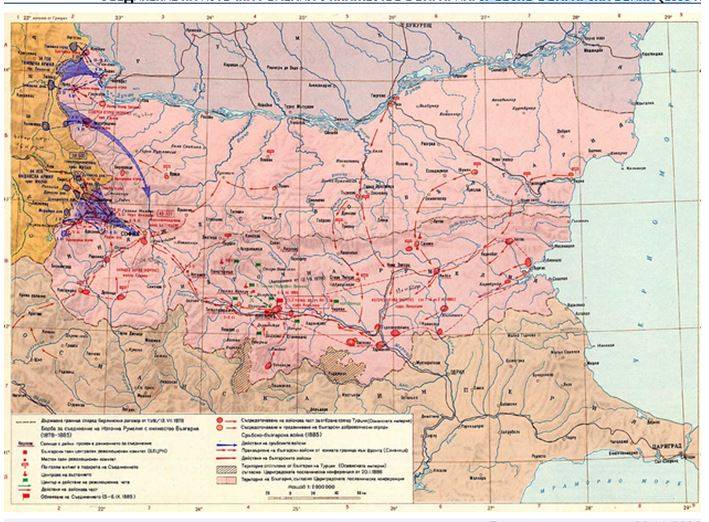
At the same time, the Serbian Sumadi division invades from the south in order to capture the road Pirot-Tryn-Breznik and later, joining with the Moravian division, take Tryn and Breznik and, breaking the Kyustendil detachment, enter the operational space of the Sofia field. In this way they will unite with the Serbian Danube division advancing in the center of the front, which is additionally reinforced by the reserve, the Drin division.
The Sumadi Division deepens 15 km into Bulgarian territory, and the Bulgarians are retreating to. Vrabcha. The defense position is led by Captain Nicola Genev. Under his command are the 4 squads and the 1 Company of regular infantry, the 2 batteries and the militia.
November 3 The Shumadi division as part of the 9-t battalions, 2-squadrons with artillery support 24-guns stormed Orlin peak, which is an important position of the Bulgarian defense. Until the middle of the day, the offensive is stopped, retreating to the Sekiritsa Pass, from where they launched a counterattack. This gives a gain in waiting time for the arrival of the main Bulgarian forces concentrated on the border with Turkey (the Ottoman Empire). Persistent battles are fought all day until November 4, when Bulgarian troops are forced to retreat to Breznik.
Just south of the Moravian Division, fighting against the Izvorsky detachment under the command of Captain Stefan Toshev, who is defending the city of Tryn and concentrated on Kolunishkoy height. After an all-day battle, the Izvorsky detachment departs to c. Treklyano. By the end of November 4, the Serbs entered the city of Tryn and continued their advance towards Radomir.
The Serbian Danube Division reaches Dragoman, where it is stopped and forced to retreat.
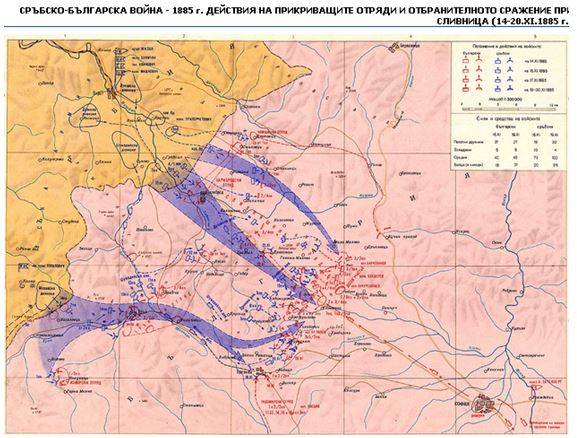
In the northern part of the Western Front, the Bulgarian tsaribrodsky detachment retreats to Slivnitsa.
The Nishav army is sent to Sofia, but in two-day battles, in which civilians also take part, its movement is significantly slowed down, which allows the Bulgarians to gather their forces in the main defensive position - Slivnitsa.
The Serbian Drin Division, which had hitherto been in reserve, joined the battle.
On the same day, the prince gathers the throne council, on which it is decided to concentrate all the cash by the moment in order to stop the Serbs before the arrival of the main forces on the Turkish border.
By noon, 4, November, Serbian troops reached the line of Bulgarian positions at Slivnitsa.
The Bulgarians had managed to dig trenches and strengthen the position by that time. The Serbian Drin and Danube divisions had already deployed near Slivnitsa, and soon after that the Shumadi and part of the Moravian division arrived.
Battle of Slivnitsa
Alexander I decides to counterattack the left flank of the enemy with s. Little Malo. The front line at Slivnitsa is divided into 3 parts, and the ratio of forces is 12 000 Bulgarians versus 25 000 Serbs.
On the morning of November 10, the decisive battle began at Slivnitsa. By 5 hours of the morning, the Serbs launched an offensive, but the battery of captain Georgy Silyanov stops the enemy without casualties from the Bulgarians. A counter attack begins with. Little Malo, just as the prince ordered, and the Serb units are forced to retreat. The main battles are fought mainly on this flank. The Serbs are making constant attacks, but without success.
Bulgarian artillery helps the infantry very much, but regardless of this, the right Bulgarian flag is forced to withdraw due to lack of ammunition. While the battle with Slivnitsa is in full swing, the Serbian Moravian took the town of Breznik and moved to the left flank of the Bulgarian positions. The Serbian Shumadi division united with the Danube and Drin at Slivnitsa.
Serbs are ready to deliver a crushing blow when reinforcements join the Bulgarians under the command of captain Peter Tantilov as part of the 4 th Thracian, 2 th Sofia, 1 th militia and one battery. So Bulgarians became 20 000, and Serbs over 31 000.
In Sofia, Alexander I is concerned that he can lose a decisive battle and is preparing a plan for the evacuation of the capital, but orders to strengthen the left flank on Slivnitsa.
6 November begins the battle across the front line. Plevensky and Bdinsky regiment counterattack, reaching the Serbian trenches.
On the left flank, the situation is worse, the Shumadi and Moravian divisions come from the south and south-west. Against the rear of the Moravian division, whose headquarters is located in the town of Breznik and which attacks Gurguliat, 1950 people were sent. under the command of captain Stefan Kisov. Regardless of the fact that this unit is defeated by Breznik, it delays the movement of this division to Slivnitsa, where the general battle is taking place, and forces the Serbs to separate the 2 battalion for cover from the south.
The Bulgarian command launched an offensive at the very end of the right flank, as a result of which Tuden, Comshtitsa, and Smolcha were liberated.
November 7, after new additions from both sides, the Serbs become up to 40 000, and the Bulgarians - 32 000.
Early in the morning, Captain Hristo Popov's detachment set off to the village of Gurguli, where in an unequal battle they inflict small forces on the defeat of the Serbian 3 battalions, the 1th battery and the 1 squadron, taking them to flight.
At this time, the Serbs on the northern flank are returning parts of lost positions. Bulgarians counterattack. The commander of the Bdinsky regiment orders a bayonet attack, and he leads the fighters, dying in battle. Later, the Bdinsky regiment was reinforced by the Pleven troops and one battery. After a fierce fighting broke out, the Serbs do not stand up to the onslaught and are turning to a stampede.
Captain Costa Panitsa detachment breaks Serbian troops at s. Murmur and with. Comštica and enters the territory of Serbia. This is the end of the battle at Slivnitsa.
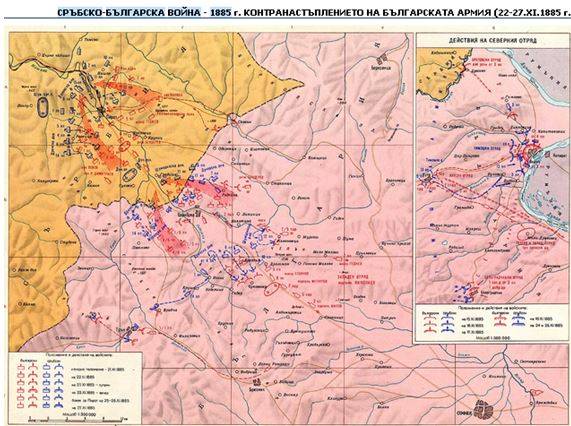
To be continued ...
Information